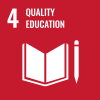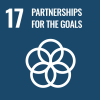Santiago, 24 October 2022 – As a young woman, Ana Marvez never imagined her classical music education would lead her to happiness teaching music to children far from home.
Brought up under Venezuela's famed El Sistema music programme, the 36-year-old music teacher and choir director left her country seven years ago in search of a better life in Chile.
“One of the most difficult aspects of having to leave one's home is to give up your profession,” she says. “I consider myself very lucky to be able to work on what I love most in my life: music.”

Ana Marvez, a 36-year-old music teacher and choir director, left her country seven years ago in search of a better life in Santiago de Chile. Photo: IOM/Gema Cortes
When she discovered many Venezuelan musicians were in the same situation, she decided to put this impressive human capital at the service of the community through the Music Foundation for Integration (Fundación Música para la Integración), a group composed of mostly refugees and migrants from Venezuela, but including Chileans and others from Colombia, Peru and Cuba.
“It is a dream come true; from the 30 musicians I met five years ago, we are now 400,” she recalls, sitting in her office at the Foundation's new headquarters in the Chilean capital, Santiago.

Ana Marvez, a 36-year-old, is teaching music to children in Santiago de Chile. Photo: IOM/Gema Cortes
Ana is one of the 7.1 million Venezuelan migrants and refugees in the world, nearly 450,000 of whom have settled in Chile since 2016. She has been fascinated by music since she was a child and values the way people connect with each other through music and how they learn and develop personally.
"Music is a good way to integrate because it does not stop when times get difficult. Art can always be a driving force for social, cultural and economic development,” she says.
The early inclusion of migrants and refugees, including in the social and cultural life of host communities, is crucial for the long-term success of integration policies. Recognizing the skills of migrants, and designing policies and measures that empower newcomers to contribute their culture and perspectives, can advance social cohesion and harness innovation.
Venezuela's National System of Youth and Children’s Orchestras and Choirs, known as “El Sistema”, is home to one of the world’s most prestigious music education programmes. It has provided a no-cost musical education to more than 1 million Venezuelan children, with a network of youth orchestras that produces world-class professional musicians, many of whom are now living abroad.

Venezuelan children taking music classes at the Music Foundation for Integration in Chile. Photo: IOM/Gema Cortes
5,000 kilometers from home
Most of the musicians playing in the Foundation are working in jobs that have nothing to do with music – waiters, nannies, shop clerks – and share common stories of their struggles in the streets of Santiago before their talent brought them together.
Rodrigo Rodriguez, a 27-year-old viola player and child of musicians who used to play in an El Sistema orchestra in Apure, Venezuela, arrived in Chile in 2019. He made the 5,000km journey by bus, with his viola on his back, unwilling to be parted even for a moment from his beloved instrument for fear of it being stolen.

Rodrigo Rodriguez carried his viola on his back during his 5,000 km journey to Chile in 2019. Photo: IOM/Gema Cortes
He scraped together a living playing in metro stations and working as a tour guide, before stumbling across the Foundation. He explained how the music he played in the metro stations of Santiago was so appealing that a lot of people hastening to the exits would pause to listen.
“The audience was very appreciative, the applauses were enthusiastic, and a handful of bills and coins were dropped into my viola case,” Rodrigo says, remembering his early days in Chile.
Rodrigo underlined that El Sistema's orchestral practices – whose method emphasizes hard work, perseverance, and discipline – prepared him to overcome life’s challenges, especially those of migration, and that he rediscovered the pleasure of music, which is at the soul of his identity.
“Being in the orchestra is feeling like a musician again. There is no happier time in my daily life than when I am doing what I love the most,” he says.

Brought up under Venezuela's famed El Sistema classical musical education programme, Ana Marvez founded the Music Foundation for Integration in Chile. Photo: IOM/Gema Cortes
Rodrigo is also grateful that his training allows him to make money and support his parents and sister in Venezuela.
Others affirmed that music provided the skills needed to endure their difficult migration journeys and equipped them with a sense of identity to transcend the material, social and emotional challenges of migration, and a personal sense of wholeness.
“We have been so well received here; Chileans have demonstrated so many of humanity’s values toward us, like welcoming us and showing solidarity. In return, we are giving our music and our talents as a way of showing our gratitude,” says Rodrigo, speaking in one of the Foundation’s classrooms, a place, he says, that “has become one of our homes.”
This story was written by Gema Cortés, IOM Media and Communications Unit, Office of the Special Envoy for the Regional Response to the Venezuelan Situation.




